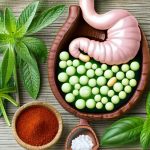Gas and bloating are incredibly common digestive issues that many people experience at some point. Often caused by the natural breakdown of food, excessive gas can lead to discomfort, abdominal swelling, and even pain. While sometimes unavoidable, lifestyle adjustments and incorporating certain natural remedies may help manage these symptoms and promote a healthier gut. Understanding the potential causes is also crucial – factors like diet, eating habits, stress levels, and underlying digestive conditions all play a role in how much gas your body produces.
This article explores various approaches to naturally alleviate gas and bloating, focusing on dietary changes, herbal remedies, lifestyle adjustments, and mindful eating practices. It’s important to remember that individual responses can vary, and what works for one person might not work for another. If symptoms are severe or persistent, it is always advisable to consult with a healthcare professional to rule out any underlying medical conditions.
Understanding the Root Causes
Bloating and gas aren’t diseases themselves but rather symptoms of an underlying issue. Often, they stem from dietary choices – consuming foods that produce more gas during digestion such as beans, lentils, broccoli, cabbage, onions, or carbonated beverages. Rapid eating, swallowing excess air, food intolerances (like lactose intolerance), and even stress can all contribute to increased gas production and digestive discomfort.
Natural Remedies for Relief
There are numerous natural approaches that may help reduce gas and bloating. These range from simple dietary changes to incorporating specific herbs and practices into your daily routine. The key is often finding what works best for your body through mindful experimentation and observation.
Dietary Adjustments for a Calmer Gut
Modifying your diet can significantly impact gas production. Consider reducing consumption of foods known to cause excess gas, such as cruciferous vegetables (broccoli, cauliflower, cabbage), beans, lentils, carbonated drinks, and artificial sweeteners. Gradually increasing fiber intake is also important; sudden increases can actually cause more gas initially. Instead, focus on adding fiber-rich foods slowly while staying well hydrated.
Small changes like chewing food thoroughly, eating smaller meals, and avoiding gum chewing can also help minimize air swallowing. Identifying potential food intolerances through an elimination diet – carefully removing suspect foods for a period then reintroducing them to observe reactions – may uncover triggers that contribute to bloating. Staying adequately hydrated is crucial as it aids in digestion and prevents constipation, which can exacerbate gas build-up.
Herbal Remedies with Potential Benefits
Certain herbs have traditionally been used to soothe digestive discomfort and reduce gas. Peppermint tea, for example, contains compounds that can relax the intestinal muscles, relieving spasms and reducing bloating. Ginger has anti-inflammatory properties and aids digestion, potentially easing gas and nausea. Chamomile tea is known for its calming effects and may help relax the digestive system.
It’s important to note that herbal remedies aren’t a quick fix and should be used cautiously. Some herbs can interact with medications or have side effects, so it’s best to research thoroughly and consult with a healthcare professional before incorporating them into your routine. Furthermore, quality of herbal products varies significantly; choose reputable brands.
Lifestyle Changes for Improved Digestion
Beyond diet and herbs, lifestyle factors play a significant role in digestive health. Regular physical activity can help stimulate intestinal movement, reducing constipation and promoting gas expulsion. Managing stress levels is also crucial as stress can disrupt digestion and contribute to bloating. Practices like yoga, meditation, or deep breathing exercises may help reduce stress and improve gut function.
Prioritizing sleep is another often-overlooked aspect of digestive health. Insufficient sleep can negatively impact the gut microbiome and lead to increased inflammation, potentially worsening gas and bloating symptoms. Establishing a consistent sleep schedule and creating a relaxing bedtime routine can contribute to overall well-being and improved digestion.
Ultimately, managing gas and bloating requires a holistic approach that addresses diet, lifestyle, and potential underlying factors. Experimenting with different remedies and paying attention to your body’s responses is key to finding what works best for you. Remember that these are supportive measures; if symptoms persist or worsen, seeking guidance from a healthcare professional is essential.


















